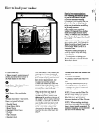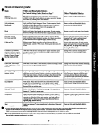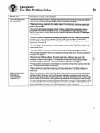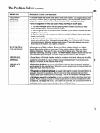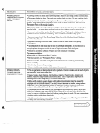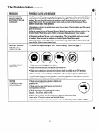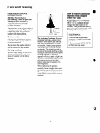
~—<
gllliia
Questions?
~ Use This Problem Solver
fiijl
PROBLEM
POSSIBLE CAUSE AND REMEDY
LINT OR RESIDUE -
● Inco~ect sorting of clothes. Separate lint-producers (such as terry towels and chenille)
ON CL~HES
from lint-receivers (such as man-made fkbrics, velveteen, corduroy).
● Washing too long, especially for smaller loads. For normal soil, wash one minute per
pound of dry clothes.
● Use of non-phosphate detergents which combine with hardness minerals to form a
precipitate which can be mistaken for lint. Use a phosphate or liquid detergent; use
warmer wash water or soften water with an installed mechanical softener or a packaged
water softener.
● Powdery residue from granular detergent may appear to be lint. Predissolve granular
detergent in hot water before adding to washer; make sure detergent is completely
dissolved before adding clothes; switch to liquid or cold water detergent or use warmer
wash water. See page 15.
● Overloading will cause abrasion which creates excessive lint. Wash fewer items with
correct water level.
● Too much bleach. Use correct amount of bleach according to package directions.
● Not enough detergent to hold lint in suspension during wash cycle. Increase amount of
detergent. See page 15.
● Incorrect use of fabric softener+ If us~ in wash cycle, softeners may react with
detergent to create a white deposit. Use softeners in rinse cycle only unless package
specifies adding to wash cycle. Use Fabric Sofkner Dispenser. Seepage 9.
● Pilling usuall y on polyester-cotton blends is caused by normal wear and may look like
lint. Turning clothes inside-out may help.
● Static electricityy caused by overdrying will cause attraction. Use fabric softener in
rinse cycle.
GREASY OR OILY
These are sometimes called “Invisible Stains” because you may not notice them before
STAINS ON
washing clothes. However, if oily soils are not completely removed in wash cycle, the
LAUNDERED
oily spots may pick up dirt from the wash water. The spots will then be very visible. They
GARMENTS
are not caused by the washer. Wash synthetic garments as soon as possible after wearing.
Use more detergent than normal and hottest water fabric can stand. If spots appear, rub in
undiluted liquid detergent, let stand 30 minutes and rewash with extra detergent using
hottest water fabric can stand. Use “Extra Cleaning” cycles, see page 5.



